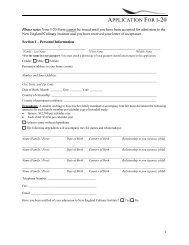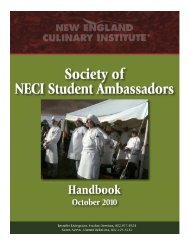Student Handbook - New England Culinary Institute
Student Handbook - New England Culinary Institute
Student Handbook - New England Culinary Institute
You also want an ePaper? Increase the reach of your titles
YUMPU automatically turns print PDFs into web optimized ePapers that Google loves.
Intervention<br />
NECI considers it has an obligation to intervene in<br />
the activities of a student any time there is concern<br />
about the physical or psychological welfare of that<br />
student or other students, or any time the student’s<br />
academic performance is suffering due to<br />
detrimental behavior. This may include, but is not<br />
necessarily limited to drug and alcohol abuse. The<br />
main objective of intervention is to help individuals<br />
face their problems so they can effectively function<br />
within the program.<br />
Intervention is a way for the school to identify the<br />
problem, to negotiate a plan to rectify the situation<br />
in the most constructive manner possible, and to<br />
follow through in support of the agreed-upon plan.<br />
The plan is written in the form of a contract that the<br />
school approves and the student signs. Failure to<br />
follow the plan may lead to suspension from the<br />
program. A crisis intervention counselor and/or<br />
drug testing/alcohol assessment may be<br />
recommended or mandated. NECI respects the<br />
privacy and individual rights of students, yet must<br />
also be responsive to the dangerous or destructive<br />
behavior of an individual toward others or<br />
him/herself and to applicable local, state, and<br />
federal laws. If the school receives complaints from<br />
the community regarding irresponsible acts of a<br />
student, the student may be held accountable by the<br />
school. Such acts may include, but are not limited<br />
to: writing bad checks, disorderly conduct, theft,<br />
and liquor law violations. Such acts may be grounds<br />
for student violations, fines, suspension, and<br />
dismissal.<br />
To ensure fairness, continuity, and cohesiveness, an<br />
administrative team will manage the intervention<br />
program. The team is normally made up of Director<br />
of Academic Services, the Academic Advisor, the<br />
Coordinator of <strong>Student</strong> Services, the Coordinator of<br />
<strong>Student</strong> Programs, and the Department Chair for the<br />
student’s program.<br />
Referral<br />
Confidential referrals can be made for students who<br />
believe they may have an alcohol or drug abuse<br />
problem. An appropriate referral may be made after<br />
consultation with the Coordinator of <strong>Student</strong><br />
Services or the Coordinator of <strong>Student</strong> Programs.<br />
Possible referrals include a private counselor,<br />
psychologist, medical physician, state-subsidized<br />
agency or counseling service, support group,<br />
residential treatment program, or preferred religious<br />
agency or individual. Names and services of<br />
referrals are available through the office of <strong>Student</strong><br />
Services. Evidence of regular participation with an<br />
approved professional counselor or service may be<br />
required in order for the student to remain enrolled<br />
in the program. Every effort will be made to keep<br />
all referrals as non-punitive as possible.<br />
Regular support in Montpelier is provided by such<br />
agencies as the Washington County Mental Health<br />
Services (229.0591) in Montpelier, Maple Leaf<br />
Farm (899.9211) in Underhill (providing regional<br />
residential treatment), Central Vermont Substance<br />
Abuse Services (223.4156) in Berlin, and the<br />
Washington County Youth Services Bureau (up to<br />
age 22, 229.9151) in Montpelier.<br />
Training<br />
A group drug and alcohol awareness program is<br />
presented during the first term in the Professional<br />
Development class. In addition, drug and alcohol<br />
awareness training is provided for Resident<br />
Assistants and faculty. This training may, at times,<br />
include presentations conducted by professionals<br />
within the local community.<br />
Summary and Review<br />
Federal law requires all institutions receiving<br />
federal financial assistance to implement and<br />
enforce drug and alcohol prevention policies. NECI<br />
strongly supports this initiative. Any violation of<br />
drug and alcohol law, even for a first offense, may<br />
result in penalties up to and including termination<br />
of enrollment.<br />
Possession, solicitation, sale, or use of alcohol and<br />
illegal drugs is prohibited. NECI refers individuals<br />
who violate the law regarding illegal drugs to the<br />
appropriate law enforcement agencies. The misuse<br />
and or abuse of alcohol, public intoxication or<br />
illegal drugs will not be tolerated.<br />
Misuse and/or abuse of alcohol or drugs will be<br />
dealt with in a serious, swift, and direct manner<br />
following the guidelines of this policy. NECI<br />
reserves the right to take appropriate action on any<br />
violation, including intervention, referral and<br />
administrative action which could result in<br />
suspension, dismissal, and/or referral to law<br />
enforcement officials.<br />
NECI, while upholding the law and while<br />
discouraging illicit drug and alcohol use, also takes<br />
the initiative to inform and educate all students<br />
(users and nonusers alike) on drugs and alcohol and<br />
their effects, and confidentially advises drug and<br />
alcohol abusers. The school wishes to promote early<br />
Page 18






